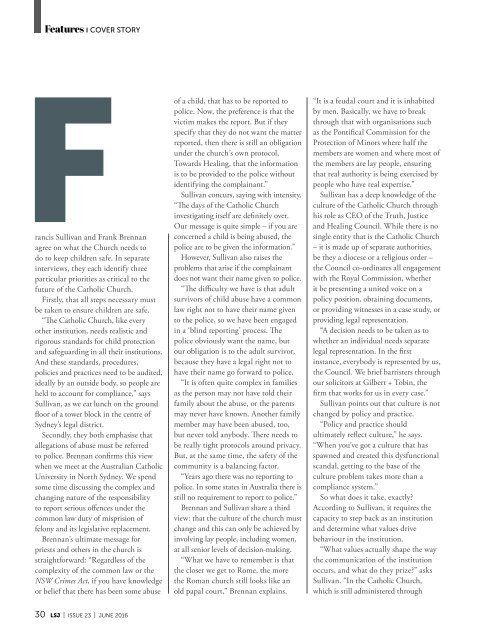AND HEALING
29eK22w
29eK22w
You also want an ePaper? Increase the reach of your titles
YUMPU automatically turns print PDFs into web optimized ePapers that Google loves.
Features COVER STORY<br />
rancis Sullivan and Frank Brennan<br />
agree on what the Church needs to<br />
do to keep children safe. In separate<br />
interviews, they each identify three<br />
particular priorities as critical to the<br />
future of the Catholic Church.<br />
Firstly, that all steps necessary must<br />
be taken to ensure children are safe.<br />
“The Catholic Church, like every<br />
other institution, needs realistic and<br />
rigorous standards for child protection<br />
and safeguarding in all their institutions.<br />
And these standards, procedures,<br />
policies and practices need to be audited,<br />
ideally by an outside body, so people are<br />
held to account for compliance,” says<br />
Sullivan, as we eat lunch on the ground<br />
floor of a tower block in the centre of<br />
Sydney’s legal district.<br />
Secondly, they both emphasise that<br />
allegations of abuse must be referred<br />
to police. Brennan confirms this view<br />
when we meet at the Australian Catholic<br />
University in North Sydney. We spend<br />
some time discussing the complex and<br />
changing nature of the responsibility<br />
to report serious offences under the<br />
common law duty of misprision of<br />
felony and its legislative replacement.<br />
Brennan’s ultimate message for<br />
priests and others in the church is<br />
straightforward: “Regardless of the<br />
complexity of the common law or the<br />
NSW Crimes Act, if you have knowledge<br />
or belief that there has been some abuse<br />
of a child, that has to be reported to<br />
police. Now, the preference is that the<br />
victim makes the report. But if they<br />
specify that they do not want the matter<br />
reported, then there is still an obligation<br />
under the church’s own protocol,<br />
Towards Healing, that the information<br />
is to be provided to the police without<br />
identifying the complainant.”<br />
Sullivan concurs, saying with intensity,<br />
“The days of the Catholic Church<br />
investigating itself are definitely over.<br />
Our message is quite simple – if you are<br />
concerned a child is being abused, the<br />
police are to be given the information.”<br />
However, Sullivan also raises the<br />
problems that arise if the complainant<br />
does not want their name given to police.<br />
“The difficulty we have is that adult<br />
survivors of child abuse have a common<br />
law right not to have their name given<br />
to the police, so we have been engaged<br />
in a ‘blind reporting’ process. The<br />
police obviously want the name, but<br />
our obligation is to the adult survivor,<br />
because they have a legal right not to<br />
have their name go forward to police.<br />
“It is often quite complex in families<br />
as the person may not have told their<br />
family about the abuse, or the parents<br />
may never have known. Another family<br />
member may have been abused, too,<br />
but never told anybody. There needs to<br />
be really tight protocols around privacy.<br />
But, at the same time, the safety of the<br />
community is a balancing factor.<br />
“Years ago there was no reporting to<br />
police. In some states in Australia there is<br />
still no requirement to report to police.”<br />
Brennan and Sullivan share a third<br />
view: that the culture of the church must<br />
change and this can only be achieved by<br />
involving lay people, including women,<br />
at all senior levels of decision-making.<br />
“What we have to remember is that<br />
the closer we get to Rome, the more<br />
the Roman church still looks like an<br />
old papal court,” Brennan explains.<br />
“It is a feudal court and it is inhabited<br />
by men. Basically, we have to break<br />
through that with organisations such<br />
as the Pontifical Commission for the<br />
Protection of Minors where half the<br />
members are women and where most of<br />
the members are lay people, ensuring<br />
that real authority is being exercised by<br />
people who have real expertise.”<br />
Sullivan has a deep knowledge of the<br />
culture of the Catholic Church through<br />
his role as CEO of the Truth, Justice<br />
and Healing Council. While there is no<br />
single entity that is the Catholic Church<br />
– it is made up of separate authorities,<br />
be they a diocese or a religious order –<br />
the Council co-ordinates all engagement<br />
with the Royal Commission, whether<br />
it be presenting a united voice on a<br />
policy position, obtaining documents,<br />
or providing witnesses in a case study, or<br />
providing legal representation.<br />
“A decision needs to be taken as to<br />
whether an individual needs separate<br />
legal representation. In the first<br />
instance, everybody is represented by us,<br />
the Council. We brief barristers through<br />
our solicitors at Gilbert + Tobin, the<br />
firm that works for us in every case.”<br />
Sullivan points out that culture is not<br />
changed by policy and practice.<br />
“Policy and practice should<br />
ultimately reflect culture,” he says.<br />
“When you’ve got a culture that has<br />
spawned and created this dysfunctional<br />
scandal, getting to the base of the<br />
culture problem takes more than a<br />
compliance system.”<br />
So what does it take, exactly?<br />
According to Sullivan, it requires the<br />
capacity to step back as an institution<br />
and determine what values drive<br />
behaviour in the institution.<br />
“What values actually shape the way<br />
the communication of the institution<br />
occurs, and what do they prize?” asks<br />
Sullivan. “In the Catholic Church,<br />
which is still administered through<br />
30 LSJ I ISSUE 23 I JUNE 2016


